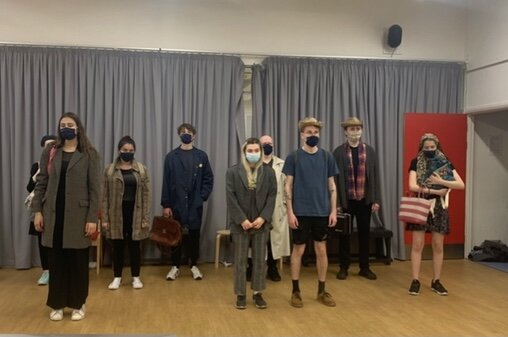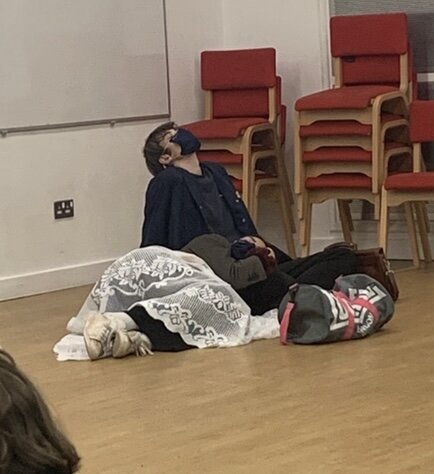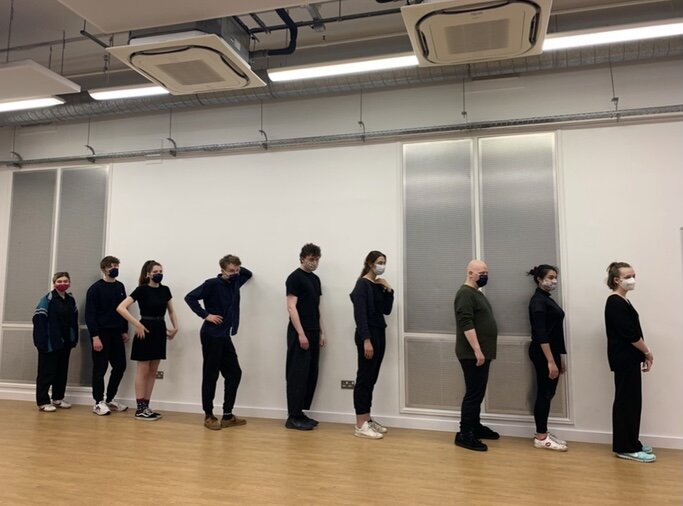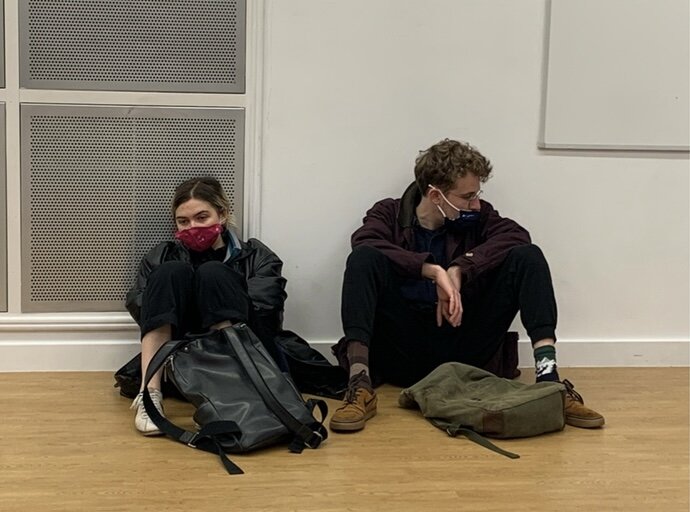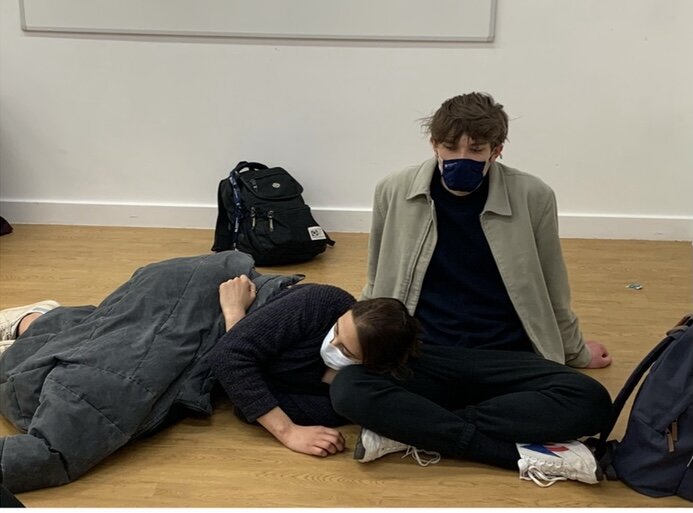The Arrival
Royal Birmingham Conservatoire, May 2021
Notes from Director…
In 2013 when I left the UK for an adventure in Australia as Senior Lecturer in Acting at The National Institute of Dramatic Art I bid England farewell with the last production I directed with Tamasha, The Arrival – based on the graphic novel by Shaun Tan, co-created by myself and Sita Brahmachari and in collaboration with The National Centre for Circus Arts.
Now eight years later I return to the Arrival with second year students at The Royal Birmingham Conservatoire to work on this piece as an ensemble largely devised by the company. The sparse text of The Arrival forms a scaffold for the devising process, dispensing the tension that can often come when devising and starting with a completely blank page. The existing text is open enough so all actor’s cultural contexts can by utilised and the languages used in this production were Hebrew, Greek, Mandarin, German and Spanish because of the make up of the company. Set movement pieces were devised by the company and each had their own distinct personality , very different from the original production.
It was such a pleasure to work on this beautiful and poignant story of migration with the curious and engaged students at The Conservatoire – the photos and reflections will give you more of an insight in how we worked in the rehearsal room.
Student Reflection 1
Being one of two people of colour in my year, and being the only international one of the two of us, I really felt very disconnected from the year group in first year because it took a long time for me to understand the culture here. I’ve always felt a bit like the “token Asian” on the course, and this made me feel quite “othered” particularly in terms of the curriculum.
When I received this play and my casting I was terrified - I really didn’t want to speak Mandarin because I was scared it would make the teachers and students subconsciously associate me with being “other”, despite all the hard work I’d done to get on top of being as good as these people at their own game, if that makes sense.
But by having this safe space created, and this celebration of other cultures and experiences, I slowly became a lot more comfortable speaking Mandarin, and by extension, being Asian. I realised my peers didn’t disdain my “otherness”, but thought it was fantastic that I was different. And having a director and a cast who celebrated that really helped me overcome my self-consciousness about not being white, and it really meant a lot more to me than I can express because I’ve spent so much time being afraid of being Asian. Being comfortable being me while performing is such a new experience and I’m very grateful for it.
I’ve also learnt so much about acting through this process. Re-learning to have that “pleasure to play” and that desire to have everyone look at me and listen to me has changed my experience. I’ve learnt to not plan ahead, and to be excited when I didn’t know how my partner was going to respond. I’ve learnt that really connecting with my partner and trusting them/ the ensemble to give everything I need is what makes for a good performance.
Also, I’ve learnt how important it is to believe you can do it.
Student Reflection 2
Devising was always an area of theatre that I was very interested in. I find the process of creating work as part of an ensemble fascinating and very beneficial in actor training. I particularly enjoyed being part of the creating team and having to work with a brief (music, themes, length of piece).
Going into the rehearsal space after such a long period spent online was daunting at first. I had lost almost all my confidence on stage and my creative outlet. Our director really helped us ease back into the work and provided us with the confidence needed to take ownership of our work.
Throughout the creative process I felt that sense of ownership of my work and my input on the team. I felt comfortable contributing my ideas to the rest of the team. We had a very healthy and easy process when creating. Even if ideas weren’t utilised, I always felt heard.
The chemistry within our group was one of the best I’ve had in my actor training life. Everyone contributed equally. What I love is that if you watch the final piece, you can see glimpses of our own personalities as actors in each piece. This project wouldn’t have been the same if it weren’t for this group and our director and vice versa.
I also learnt a lot about the simplicity it sometimes takes. As someone who wants to do physical theatre as a career, I always relied on complicated physical theatre movements to convey the message. Being able to stand on stage, do something really simple and still captivate the audience, was very important to me.
Being able to just bring myself into the rehearsal room and build the characters on that was a relief. I think throughout the project I found the joy of acting . It was something that we discussed in rehearsal. How we as actors have to find the joy of playing each character without being self-indulgent. I loved how in this project I was able to express my individuality and speak my own language.
Student Reflection 3
"Before entering this process, I was quite concerned about the material in front of me. Previously in my acting I have always tried to supress my race and family history whilst trying to avoid conversations that had anything to do with it. This was because I was in fear of being segregated or put into a box which usually occurs whenever it gets bought up. I am from a very close-minded small town and learnt to ignore it to keep friends around me. I very quickly realised that it is not something to hide. Exploring a play about immigration and respecting, learning, and valuing the hardships they face, I soon realised this was something necessary for my growth not only as an actor, but a person. I was able to and encouraged to go back into my family timeline to understand and empathise truly with what they had to overcome and why I am even here now. Throughout this process I have been seen and valued as a member of the cast. Kristine has given me a safe space to let go and explore the stories of others whilst feeling a part of something greater than myself; a moving painting with people's truth at the centre of it all. I am so pleased with the whole experience and wouldn't change a thing. I believe as an ensemble we have all created something to be proud of and I am excited to share stories inspired by the real-life struggles immigrants face every day which shouldn't be ignored but acknowledged at full capacity."
Student Reflection 4
It’s a difficult thing having to look back at a process that now seems like it was either years long or that it was over within minutes, and to reflect on what exactly I have learned from it. But I will attempt to do exactly that nonetheless!
Coming into the project, I was very excited. Firstly because I grew up with Shaun Tan’s novel that my father bought me when I was about ten years old, secondly because of the prospect of doing a piece that I assumed is going to be multi lingual, and thirdly because of the simple notion that we are actually going to be doing real and live theatre in a room filled with creative people.
The first thing I can say about the process is that not only that my expectations were met, I have gained so much more than what I thought I would. Being able to work with my own identity, with my language, Hebrew, was an incredible thing that helped me do a lot of deep soul searching and realize how much my identity means to me.
There were many times in the past two years of me being in England and away from Israel for the first time, where because I suddenly had to start speaking a language that I never really used to use - having to “live in English”, I felt like my Hebrew was decaying, A thing that I never thought was possible, because that is my language. And this project was food for my Hebrew like water is vital to a plant. I’ve recently watched an incredible TED talk with a guy called Donall O Healai about the lost Irish language, where he says, that “Irish is the language of his soul”. Working on “The Arrival” made me realize that Hebrew is the language of my soul, and no matter how intellectually well I can comprehend English, my soul is made out of a different set of alphabet, so even before I start talking about the gains I’ve made for my craft and in a performance manner, this achievement and revelation, on it’s own, is worth all the work I have put in.
My identity isn’t all I gained. One of the most important things I’ve learnt is that précised and impactful work doesn’t necessarily come from rigours, and at times robotic mind generated rehearsing methodology. Beautifully truthful theatre could come from a great sense of ease and fluidity that is generated with the soul, the being of the actor. For the past months I have been exploring connecting my acting training with Japanese Butoh, and have done a great deal of reading about embodied practices like Butoh and Zazen, and it was extremely beneficial to see that the concepts of those practices can be applied to “contemporary British” (if that is even a thing) rehearsal room, with a theatrical term that I’m sure will remain with me for the rest of my life – Complicité.
It’s been very pleasureful to work in the greatly respectful room that we had as an ensemble, and I am so pleased to hear that some people that were nervous about the prospect of devising material or working with their true selves found it empowering and embraced their identities. That is a really magical achievement.
I think that another very important lesson that I learnt came from having to work with what the ensemble can give. Coming into a devising project I knew straight ahead that I would have a lot of ideas that I would want to explore. Within myself I have no boundary of artistic ideas that I would like to play with, and am always up to do more and to experiment with more, so I wanted to create a very physical, emotionally demanding, dark and graphic piece (maybe a bit in the style of Gecko, Ingmar Bergman and David lynch combined). But, seeing that this performance opportunity meant something different to a lot of the cast members, and it was more about breaking confidence barriers in order to simply find freedom to play, I knew that even if the piece won’t get to some extreme places that I wanted to explore, it’s worth me “losing” that, so that my ensemble gets the most they are ready and wanting to gain. Through that approach, I realized that there was a lot for me to gain too, and that now I am even more ready to tackle the kind of performance style that I want to explore.
Student Reflection 5
Returning after lockdown 2 to full-time actor training was a tad daunting at first. Kristine made us all feel so welcome and comfortable. Kristine has a way of working that we hadn't been exposed to before. You don't have to always overload and burden yourself with huge amounts of text and character work. You don't have to rehearse constantly to make any progress. You work smart, be relaxed, and have complicité with other actors. Then ideas will flow.
Rehearsing was a joy. Knowing that in the room there is no pressure, you do what you feel and DON'T PLAN AHEAD. This gave me a sense of freedom and most importantly a way to get out of my head! You don't need to constantly think and justify what the character would do in certain situations. All you need is to trust and believe in yourself.
Using different languages was very important in this project and being able to hear my peers speak in other languages was incredible. An improvisation exercise that really helped me understand complicité was when we spoke in another language or A,B,C's. Even though you had no idea what the other person was saying you could understand them and their relationship completely.
Before the project, I was a bit nervous as I hadn't had much experience in devising and didn't really know where to start. Kristine gave us an outline and let us play. This is the best way to devise, not to talk it through and plan every single move. Just play with it, trust the other actors and something will come.
Overall I have learned so much and my eyes have been opened into a new realm of acting. There are alternative techniques, you don't need to be constantly in your head thinking about what the character would do, just do it! Most importantly have the 'pleasure to play' and complicité with other actors. I will always remember this process and plan to explore other techniques based on Kristine's way of working.

